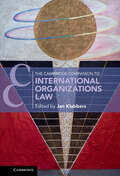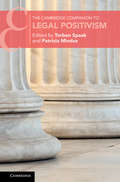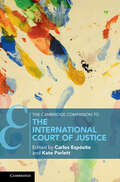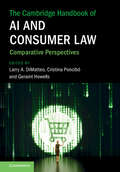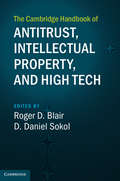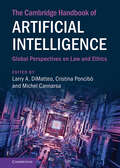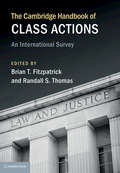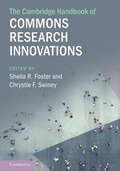- Table View
- List View
The Cambridge Companion to International Arbitration (Cambridge Companions to Law)
by C. L. LimThis Cambridge Companion explores the main senses of the term 'international arbitration'; including the arbitration of private commercial disputes, disputes between a State and a foreign investor, disputes between States and also between a State and its parts. It treats these various forms as being inter-related, if not always conceptually, then as a matter of history, rather than as collective victims of imprecise language. The book touches not only on current debates but also more foundational aspects, such as the tension between party autonomy and State authority, and the pacifist roots of modern international arbitration. Thus, it aims to offer a concise survey of the history, the main issues as well as the latest developments in a single, handy volume. It will be an invaluable introduction to the subject for students studying international arbitration, commercial law and international law, and also lawyers and the general reader.
The Cambridge Companion to International Criminal Law
by William A. SchabasThis comprehensive introduction to international criminal law addresses the big issues in the subject from an interdisciplinary perspective. Expert contributors include international lawyers, judges, prosecutors, criminologists and historians, as well as the last surviving prosecutor of the Nuremberg Trials. Serving as a foundation for deeper study, each chapter explores key academic debates and provides guidelines for further reading. The book is organised around several themes, including institutions, crimes and trials. Purposes and principles place the discipline within a broader context, covering the relationship with human rights law, transitional justice, punishment and the imperatives of peace. Several tribunals are explored in depth, as are many emblematic trials. The book concludes with perspectives on the future.
The Cambridge Companion to International Law
by James Crawford James Crawford Martti Koskenniemi Surabhi Ranganathan Martti KoskenniemiThis intellectually rigorous introduction to international law encourages readers to engage with multiple aspects of the topic: as 'law' directing and shaping its subjects; as a technique for governing the world of states and beyond statehood; and as a framework within which several critical and constructivist projects are articulated. The articles situate international law in its historical and ideological context and examine core concepts such as sovereignty, jurisdiction and the state. Attention is also given to its operation within international institutions and in dispute settlement, and a separate section is devoted to international law's 'projects': protecting human rights, eradicating poverty, the conservation of resources, the regulation of international trade and investment and the establishment of international order. The diverse group of contributors draws from disciplinary orientations ranging from positivism to postmodernism to ensure that this book is informed theoretically and politically, as well as grounded in practice.
The Cambridge Companion to International Organizations Law (Cambridge Companions to Law)
by Jan KlabbersThe Cambridge Companion to International Organizations Law illuminates, from a legal perspective, what international organizations are, what makes them 'tick' and how they affect the world around them. It critically discusses such classic issues as the concept of international organization and membership, as well as questions of internal relations, accountability and how they make law, set standards and otherwise affect both their member states and the world around them. The volume further discusses the role of international organizations in particular policy domains, zooming in on domains which are not often discussed through international organizations, including disarmament, energy, food security and health. Eventually, a picture emerges of international organizations as complex phenomena engaging in all sorts of activities and relationships, the operation and authority of which is underpinned by the rules and regulations of international law.
The Cambridge Companion to Legal Positivism (Cambridge Companions to Law)
by Patricia MindusLegal positivism is one of the fundamental theories of jurisprudence studied in law and related fields around the world. This volume addresses how legal positivism is perceived and makes the case for why it is relevant for contemporary legal theory. The Cambridge Companion to Legal Positivism offers thirty-three chapters from leading scholars that provide a comprehensive commentary on the fundamental ideas of legal positivism, its history and major theorists, its connection to normativity and values, its current development and influence, as well as on the criticisms moved against it.
The Cambridge Companion to Natural Law Ethics (Cambridge Companions to Philosophy)
by Tom AngierNatural law ethics centres on the idea that ethical norms derive from human nature. The field has seen a remarkable revival since the millennium, with new work in Aristotelian metaphysics complementing innovative applied work in bioethics, economics and political theory. Starting with three chapters on the history of natural law ethics, this volume moves on to various twentieth-century theoretical innovations in the tradition, and then to natural law as embedded in the three Abrahamic faiths. It closes with sections on applied natural law ethics and the challenges and prospects for natural law ethics in the twenty-first century. Uniquely interdisciplinary and written without technical jargon, the book will be of great interest to students and researchers in philosophy, theology, political theory and economics. They will find this the go-to resource for cutting-edge thinking in natural law ethics.
The Cambridge Companion to Pufendorf (Cambridge Companions to Law)
by Knud Haakonssen Ian HunterIn the same intellectual league as Grotius, Hobbes and Locke, but today less well known, Samuel Pufendorf was an early modern master of political, juridical, historical and theological thought. Trained in an erudite humanism, he brought his copious command of ancient and modern literature to bear on precisely honed arguments designed to engage directly with contemporary political and religious problems. Through his fundamental reconstruction of the discipline of natural law, Pufendorf offered a new rationale for the sovereign territorial state, providing it with non-religious foundations in order to fit it for governance of multi-religious societies and to protect his own Protestant faith. He also drew on his humanist learning to write important political histories, a significant lay theology, and vivid polemics against his many opponents. This volume makes the full scope of his thought and writing accessible to English readers for the first time.
The Cambridge Companion to Rawls
by Samuel FreemanEach volume of this series of companions to major philosophers contains specially commissioned essays by an international team of scholars and will serve as a reference work for students and nonspecialists. John Rawls is the most significant and influential philosopher and moral philosopher of the twentieth century. His work has profoundly shaped contemporary discussions of social, political and economic justice in philosophy, law, political science, economics and other social disciplines. In this exciting collection of essays, many of the world's leading political and moral theorists discuss the full range of Rawls's contribution to the concepts of political and economic justice, democracy, liberalism, constitutionalism, and international justice. There are also assessments of Rawls's controversial relationships with feminism, utilitarianism and communitarianism. New readers will find this to be an accessible guide to Rawls. Advanced students and specialists will find a conspectus of developments in the interpretation of Rawls.
The Cambridge Companion to Roman Law
by David JohnstonThis book reflects the wide range of current scholarship on Roman law. The essays, newly-commissioned for this volume, cover the sources of evidence for classical Roman law; the elements of private law, as well as criminal and public law; and the second life of Roman law in Byzantium, in civil and canon law, and in political discourse from AD 1100 to the present. Roman law nowadays is studied in many different ways, which is reflected in the diversity of approaches in the essays. Some focus on how the law evolved in ancient Rome, others on its place in the daily life of the Roman citizen, still others on how Roman legal concepts and doctrines have been deployed through the ages. All of them are responses to one and the same thing: the sheer intellectual vitality of Roman law, which has secured its place as a central element in the intellectual tradition and history of the West.
The Cambridge Companion to Spinoza'S Ethics
by Olli KoistinenSince its publication in 1677, Spinoza's Ethics has fascinated philosophers, novelists, and scientists alike. It is undoubtedly one of the most exciting and contested works of Western philosophy. Written in an austere, geometrical fashion, the work teaches us how we should live, ending with an ethics in which the only thing good in itself is understanding. Spinoza argues that only that which hinders us from understanding is bad and shows that those endowed with a human mind should devote themselves, as much as they can, to a contemplative life. This 2009 Companion volume provides a detailed, accessible exposition of the Ethics. Written by an internationally known team of scholars, it is the first anthology to treat the whole of the Ethics and is written in an accessible style.
The Cambridge Companion to Virtue Ethics
by Daniel C. RussellVirtue ethics has emerged from a rich history, in which both Aristotle and Aquinas have played an important role, to become one of the fastest-growing fields in contemporary ethics. In this volume of newly commissioned essays, leading moral philosophers offer a comprehensive overview of virtue ethics. They examine the theoretical structure of virtue ethics and its place in contemporary moral theory and other topics discussed include the history of virtue-based approaches to ethics, what makes these approaches distinctive, what they can say about specific practical issues and where we can expect them to go in the future. This Companion will be useful to students of virtue ethics and the history of ethics and to others who want to understand how virtue ethics is changing the face of contemporary moral philosophy.
The Cambridge Companion to the First Amendment and Religious Liberty (Cambridge Companions to Law)
by Owen Anderson Michael D. BreidenbachThis book is an interdisciplinary guide to the religion clauses of the First Amendment with a focus on its philosophical foundations, historical developments, and legal and political implications. The volume begins with fundamental questions about God, the nature of belief and worship, conscience, freedom, and their intersections with law. It then traces the history of religious liberty and church-state relations in America through a diverse set of religious and non-religious voices from the seventeenth century to the most recent Supreme Court decisions. The Companion will conclude by addressing legal and political questions concerning the First Amendment and the court cases and controversies surrounding religious liberty today, including the separation of church and state, corporate religious liberty, and constitutional interpretation. This scholarly yet accessible book will introduce students and scholars alike to the main issues concerning the First Amendment and religious liberty, along with offering incisive new insights into one of the most important topics in American culture.
The Cambridge Companion to the International Court of Justice (Cambridge Companions to Law)
by Kate Parlett Carlos EspósitoAs international law has become more present in global policy-making, the International Court of Justice (ICJ) has come to occupy an essential and increasingly visible role in international relations. This collection explores substantive developments within the ICJ and offers critical perspectives on its historical and contemporary role. It also examines the growing role of the ICJ in the settlement of international disputes and assesses the impact of the ICJ's jurisprudence on the major areas of international law, from the territorial delimitation to human rights. With contributions from a diverse range of scholars and practitioners, the collection's contents combine a legal perspective with institutional and sociological insights on the functions of the ICJ. By considering the ICJ's character, jurisdiction and effectiveness, this collection offers a varied and holistic account of the International Court of Justice, an institution whose significance and influence only increase by the day.
The Cambridge Companion to the Philosophy of Law (Cambridge Companions to Law)
by John TasioulasWhat is the nature of law as a form of social order? What bearing do values like justice, human rights, and the rule of law have on law? Which values should law serve, and what limits must it respect in serving them? Are we always morally bound to obey the law? What are the philosophical problems that arise in specific areas of law, from criminal and tort law to contract law and public international law? The book provides an accessible, comprehensive, and high quality introduction to the major themes of legal philosophy written by a stellar international cast of contributors, including John Finnis, Martha Nussbaum, Fred Schauer, Onora O'Neill and Antony Duff. The volume is an exceptional teaching tool that provides a critical introduction to cutting-edge work in the philosophy of law.
The Cambridge Companion to the Rule of Law (Cambridge Companions to Law)
by Jens Meierhenrich Martin LoughlinThe Cambridge Companion to the Rule of Law introduces students, scholars, and practitioners to the theory and history of the rule of law, one of the most frequently invoked-and least understood-ideas of legal and political thought and policy practice. It offers a comprehensive re-assessment by leading scholars of one of the world's most cherished traditions. This high-profile collection provides the first global and interdisciplinary account of the histories, moralities, pathologies and trajectories of the rule of law. Unique in conception, and critical in its approach, it evaluates, breaks down, and subverts conventional wisdom about the rule of law for the twenty-first century.
The Cambridge Companion to the United States Constitution
by John W. Compton Karen OrrenThis Companion provides a broad, historically informed introduction to the study of the US constitutional system. In place of the usual laundry lists of cases, doctrines, and theories, it presents a picture of the constitutional system in action, with separate sections devoted to constitutional principles, organizational structures, and the various legal and extra-legal 'actions' through which litigators and average citizens have attempted to bring about constitutional change. Finally, the volume covers a number of subjects that are rarely discussed in works aimed at a general audience, but which are critical to ensuring that constitutional rights are honored in the day-to-day lives of citizens. These include standing and causes of action, suits against officeholders, and the inner workings of the Foreign Intelligence Surveillance Court (FISC). This Companion places present-day constitutional controversies in historical context, and offers insights from a range of disciplines, including history, political science, and law.
The Cambridge Constitutional History of the United Kingdom: Volume 1, Exploring the Constitution
by Peter Cane H. KumarasinghamThe Cambridge Constitutional History of the United Kingdom: Volume 2, The Changing Constitution
by Peter Cane H. KumarasinghamThe Cambridge Handbook of AI and Consumer Law: Comparative Perspectives (Cambridge Law Handbooks)
by Larry A. DiMatteo Geraint Howells Cristina PoncibóThis comprehensive handbook delves into the intricate relationship between artificial intelligence, law, and government regulations in society and business. With a particular focus on consumer-centric issues, chapters analyze the benefits and challenges of the expanding influence of AI systems on consumers, while shedding light on the psychological impact and potential harm posed by AI. Readers will navigate the complexities of tort law and its application to harm caused by AI, explore the legal conundrums arising from consumers utilizing digital delegates as agents, and uncover the innovative ways AI can be harnessed to enforce consumer law. This work is essential reading for anyone seeking to understand the implications of AI on the legal landscape, the future of the consumer marketplace, and the role of consumer law.
The Cambridge Handbook of Algorithmic Price Personalization and the Law (Cambridge Law Handbooks)
by Fabrizio Esposito Mateusz GrochowskiIn the current digital era, the growth of digital commerce and the data-driven economy has created new opportunities for firms to predict consumer behavior, including their willingness to pay a certain price. This practice of algorithmic pricing has become a widespread business model, raising concerns among economists and lawyers about its impact on the market and society. The Cambridge Handbook of Algorithmic Price Personalization and the Law is a comprehensive overview of the key debates surrounding algorithmic pricing, written by a multidisciplinary group of scholars with expertise in legal, economic, data science, and marketing research. The Handbook critically examines existing knowledge, identifies weaknesses, and proposes feasible alternatives for legal analysis, market regulation, and protection of vulnerable individuals. This comprehensive overview of algorithmic pricing is a one-stop reference for the political and legal community.
The Cambridge Handbook of Antitrust, Intellectual Property, and High Tech
by Blair Sokol D. Daniel Roger D.This Cambridge Handbook, edited by Roger D. Blair and D. Daniel Sokol, brings together a group of world-renowned professors in the fields of law and economics to assess the theory and practice of antitrust, intellectual property, and high tech. With the increased globalization of antitrust, a better understanding of how law and economics shape this interface will help academics, policymakers, and practitioners to understand the existing state of academic literature, its limits, and its relevance to real-world antitrust. The book will be an essential resource for anyone seeking to understand academic and policy considerations shaping the world of antitrust, intellectual property, and high tech.
The Cambridge Handbook of Applied Psychological Ethics (Cambridge Handbooks in Psychology)
by Mark M. Leach Elizabeth Reynolds WelfelThe Cambridge Handbook of Applied Psychological Ethics is a valuable resource for psychologists and graduate students hoping to further develop their ethical decision making beyond more introductory ethics texts.<P><P> The book offers real-world ethical vignettes and considerations. Chapters cover a wide range of practice settings, populations, and topics, and are written by scholars in these settings. Chapters focus on the application of ethics to the ethical dilemmas in which mental health and other psychology professionals sometimes find themselves. Each chapter introduces a setting and gives readers a brief understanding of some of the potential ethical issues at hand, before delving deeper into the multiple ethical issues that must be addressed and the ethical principles and standards involved. No other book on the market captures the breadth of ethical issues found in daily practice and focuses entirely on applied ethics in psychology.<P> The first handbook to focus entirely on applied ethics in psychology.<P>Includes real-world, complex ethics cases across a variety of practice settings, populations, and topics.<P>Builds on an introductory knowledge of ethics.
The Cambridge Handbook of Artificial Intelligence: Global Perspectives on Law and Ethics (Cambridge Law Handbooks)
by Larry A. DiMatteo Michel Cannarsa Cristina PoncibòThe technology and application of artificial intelligence (AI) throughout society continues to grow at unprecedented rates, which raises numerous legal questions that to date have been largely unexamined. Although AI now plays a role in almost all areas of society, the need for a better understanding of its impact, from legal and ethical perspectives, is pressing, and regulatory proposals are urgently needed. This book responds to these needs, identifying the issues raised by AI and providing practical recommendations for regulatory, technical, and theoretical frameworks aimed at making AI compatible with existing legal rules, principles, and democratic values. An international roster of authors including professors of specialized areas of law, technologists, and practitioners bring their expertise to the interdisciplinary nature of AI.
The Cambridge Handbook of Class Actions: An International Survey (Cambridge Law Handbooks)
by Brian T. Fitzpatrick Randall S. ThomasEconomic activity is more globally integrated than ever before, but so is the scope of corporate misconduct. As more and more people across the world are affected by such malfeasance, the differences in legal redress have become increasingly visible. This transparency has resulted in a growing convergence towards an American model of robust private enforcement of the law, including the class-action lawsuit. This handbook brings together scholars from nearly two dozen countries to describe and assess the class-action procedure (or its equivalent) in their respective countries and, where possible, to offer empirical data on these systems. At the same time, the work presents a variety of multidisciplinary perspectives on class actions, from economics to philosophy, making this handbook an essential resource to academics, lawyers, and policymakers alike.
The Cambridge Handbook of Commons Research Innovations (Cambridge Law Handbooks)
by Sheila R. Foster Chrystie F. SwineyThe commons theory, first articulated by Elinor Ostrom, is increasingly used as a framework to understand and rethink the management and governance of many kinds of shared resources. These resources can include natural and digital properties, cultural goods, knowledge and intellectual property, and housing and urban infrastructure, among many others. In a world of increasing scarcity and demand - from individuals, states, and markets - it is imperative to understand how best to induce cooperation among users of these resources in ways that advance sustainability, affordability, equity, and justice. This volume reflects this multifaceted and multidisciplinary field from a variety of perspectives, offering new applications and extensions of the commons theory, which is as diverse as the scholars who study it and is still developing in exciting ways.


